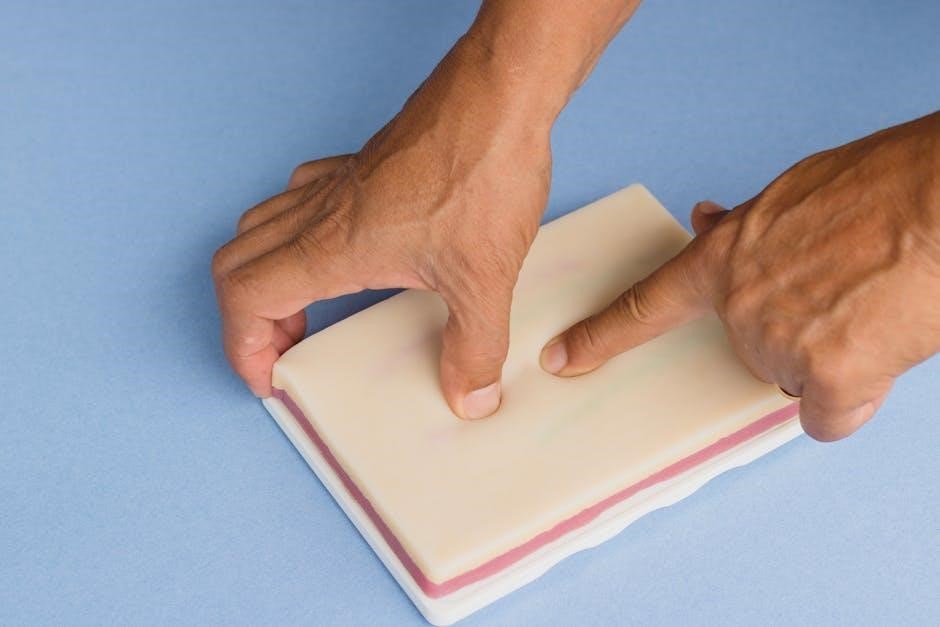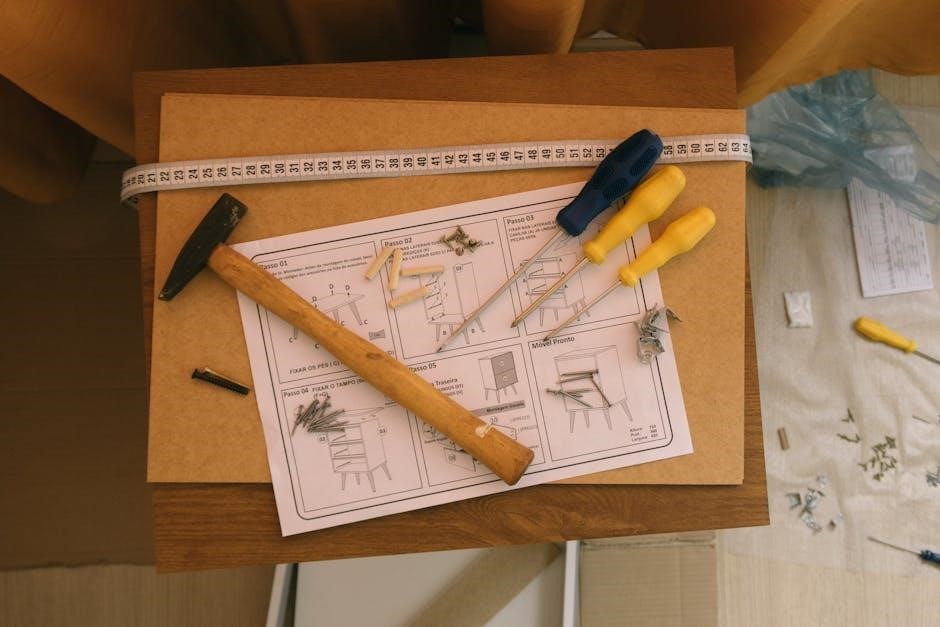
presto pressure canner instruction manual
The Presto Pressure Canner is a versatile and reliable kitchen appliance designed for safe and efficient home canning. It offers easy operation and durability, making it ideal for preserving foods while ensuring proper sterilization and sealing to prevent spoilage. Perfect for beginners and experienced users alike, it supports various canning methods and is compatible with multiple stovetop types, including induction. Follow the manual for optimal performance and safety.
1.1 Overview of the Presto Pressure Canner
The Presto Pressure Canner, model 01781, is a durable, stainless steel appliance designed for pressure canning and cooking. It features a 16-quart capacity, induction compatibility, and a locking lid for safe operation. The canner supports both high-pressure and boiling water methods, making it ideal for preserving fruits, vegetables, meats, and seafood. Its user-friendly design ensures efficient and safe food processing for home use.
1.2 Importance of Following the Instruction Manual
Adhering to the Presto Pressure Canner manual is crucial for safe and effective canning. It provides specific guidelines for processing times, pressures, and food preparation to ensure proper sterilization and sealing. Deviating from instructions can lead to spoilage, contamination, or safety hazards. Always follow the manual carefully to avoid risks and achieve optimal canning results.

Important Safety Precautions
Always exercise extreme caution when handling the Presto Pressure Canner. Avoid hot surfaces, use handles or knobs, and never move the canner with hot liquids inside. Follow all safety guidelines to prevent accidents and ensure safe operation.
2.1 General Safety Tips
Always read the manual thoroughly before use. Ensure the Presto Pressure Canner is properly closed and handles are aligned. Use genuine Presto parts and inspect the sealing ring and overpressure plug regularly. Avoid placing the canner on high BTU burners or in heated ovens. Regular maintenance ensures safe and efficient operation.
2.2 Handling Hot Liquids and Surfaces
Extreme caution is essential when handling hot liquids and surfaces. Never touch hot components or surfaces directly; use handles or knobs. Avoid sudden movements when transferring hot liquids. Ensure the area is clear of flammable materials. Always place the canner on a stable, heat-resistant surface to prevent accidental spills or burns.
2.3 Avoiding Common Hazards
Avoid using the Presto Pressure Canner on outdoor LP gas burners or gas ranges exceeding 12,000 BTUs, as this may cause damage or injury. Never place the canner in a heated oven or leave it unattended during operation. Ensure proper ventilation and avoid blockages in the vent pipe to maintain safe pressure levels and prevent potential hazards.

Understanding the Components of the Presto Pressure Canner
The Presto Pressure Canner features a pressure regulator, vent pipe, sealing ring, and overpressure plug. These components work together to ensure safe operation and proper pressure control during canning.
3.1 Pressure Regulator and Vent Pipe
The pressure regulator controls and maintains the correct pressure during canning, ensuring safe operation. The vent pipe releases excess steam and is essential for regulating pressure levels. Together, these components prevent over-pressurization and ensure reliable pressure control, making them critical for safe and efficient canning processes.
3.2 Sealing Ring and Overpressure Plug
The sealing ring forms a pressure-tight seal between the cover and body of the Presto Pressure Canner, ensuring proper pressure retention during canning. The overpressure plug, located in the cover, acts as a safety valve to release excess pressure if it builds up too high. Both components are vital for safe and efficient canning operations and should be inspected and replaced regularly to maintain optimal performance.
3.4 Canning Rack and Stainless Steel Clad Base
The canning rack ensures jars are evenly heated and prevents them from touching the base, reducing the risk of breakage. The stainless steel clad base provides durability and even heat distribution, making the Presto Pressure Canner suitable for various stovetops, including induction. These features enhance safety and efficiency during the canning process, ensuring consistent results and long appliance lifespan.
Canning Basics and Preparation
Understanding acidity and spoilage factors is crucial for safe canning. Proper headspace measurement and sealing techniques ensure jars are processed correctly. Prepare food according to specific guidelines for optimal results and safety.
4.1 Understanding Acidity and Spoilage Factors
Acidity plays a crucial role in preventing bacterial growth and spoilage. High-acid foods like fruits naturally resist microorganisms, while low-acid foods require careful processing. Understanding these factors ensures proper canning techniques, maintaining safety and quality. Always follow tested guidelines to prevent contamination and spoilage, especially for low-acid foods needing pressure canning to eliminate harmful bacteria.
4.2 Measuring Headspace and Sealing Jars
Accurate headspace measurement is critical for successful canning. Too much headspace can lead to under-processing, while too little may trap food particles, preventing a proper seal. Use a measuring tool to ensure correct headspace. Remove air bubbles by gently running a utensil around the jar’s interior. Tighten lids finger-tight to allow steam escape, ensuring a vacuum seal forms during cooling.
4.3 Preparing Food for Canning
Food must be properly prepared before canning to ensure safety and quality. Wash, peel, and chop fruits and vegetables as needed. Treat apples and apricots with ascorbic acid to prevent browning. For meats, brown them first to enhance flavor. Pack food into jars while hot, leaving recommended headspace. Use fresh, high-quality ingredients for best results.

Step-by-Step Pressure Canning Instructions
Assemble the canner, place jars inside, and secure the lid. Heat to achieve pressure, maintain it, and process for the recommended time. Let cool naturally.
5.1 Assembling the Canner and Placing Jars
Begin by placing the canning rack at the bottom of the Presto Pressure Canner. Fill the canner with the recommended amount of water, typically 2-3 inches deep. Carefully load the prepared jars onto the rack, ensuring they are not overcrowded. Align the cover’s V mark with the body handle and secure it tightly. Ensure all components are properly assembled before proceeding.
5.2 Achieving and Maintaining Pressure
Place the canner on a burner set to high heat until steam escapes from the vent pipe. Reduce heat to maintain a steady pressure, monitoring the regulator. Ensure the vent pipe remains unobstructed to avoid pressure buildup issues. Adjust the heat as needed to keep the pressure within the recommended range for safe and effective canning. Always follow manual guidelines.
5.3 Cooling and Sealing Jars
After processing, turn off the heat and let the canner cool naturally until the pressure drops to zero. Remove jars using a jar lifter and place them on a wire rack or towel to cool. Avoid touching lids for 24 hours to ensure proper sealing. Sealed jars will have lids that do not move when pressed. If a jar does not seal, check for debris on the rim and reprocess within 24 hours. Proper cooling and sealing are critical for long-term food preservation and safety.

Troubleshooting Common Issues
Identify and resolve issues like stuck covers or pressure problems by checking seals and vents. Address liquid loss by ensuring proper jar packing and headspace. Always refer to the manual for detailed solutions to ensure safety and optimal performance.
6.1 Identifying and Resolving Leaks
Leaks in the Presto Pressure Canner often occur due to worn-out or damaged seals. Inspect the sealing ring and overpressure plug for wear. Clean or replace these parts as needed. Ensure proper alignment of the cover and body. If issues persist, check for blockages in the vent pipe and verify that jars are packed correctly to avoid liquid loss during processing.
6.2 Dealing with Stuck Covers or Pressure Issues
If the cover is stuck, do not force it open. Wait until the canner cools completely, as residual pressure may still be present. For pressure issues, ensure the vent pipe is clear and the sealing ring is intact. If the overpressure plug is dislodged, contact Presto’s customer service for assistance to prevent further complications.
6.3 Addressing Liquid Loss During Processing
Liquid loss during processing often occurs due to overfilling jars, insufficient exhaust, or sudden pressure changes. To prevent this, ensure jars are filled correctly, follow venting guidelines, and maintain stable pressure. If liquid loss is excessive, stop processing and reprocess the food with proper adjustments to avoid contamination and ensure food safety.

Canning Recipes and Guidelines
The Presto Pressure Canner supports various canning methods for meats, vegetables, and seafood. Always follow tested recipes, ensuring proper acidity and headspace for safe preservation. Use genuine Presto parts and guidelines for consistent results and food safety.
7.1 Canning Fruits and Vegetables
The Presto Pressure Canner is ideal for preserving fruits and vegetables. For fruits, use a hot pack method with syrup or juice, while vegetables require a boiling water bath. Ensure proper headspace and acidity levels for safe canning. Follow tested recipes and processing times to achieve optimal results and prevent spoilage. Always use fresh, ripe ingredients.
7.2 Specific Instructions for Meats and Seafood
The Presto Pressure Canner excels at processing meats and seafood, requiring high pressure to ensure safety. Use fresh, lean meats and follow USDA guidelines to avoid spoilage. Always maintain recommended pressures and processing times. Acidity levels are crucial for preservation, especially in seafood. Ensure all guidelines are met to prevent foodborne illness and spoilage.
7.3 Tips for Avoiding Spoilage
Ensure jars are properly sterilized and lids are sealed tightly to prevent contamination. Always follow USDA guidelines for processing times and pressures. Replace the sealing ring every 3 years and check for nicks or rust on lids and jars. Store jars in a cool, dark place and check seals regularly to avoid spoilage.

Care and Maintenance of the Presto Pressure Canner
Regularly clean the vent pipe and components, check and replace worn parts like the sealing ring, and ensure proper storage to maintain efficiency and safety.
8.1 Cleaning and Replacing Parts
- Clean the vent pipe and components regularly to ensure proper function and safety.
- Replace the sealing ring every 3 years and the overpressure plug as needed.
- Check for worn-out parts and replace them with genuine Presto components.
- Keep the canner clean and free of debris after each use.
8.2 Storing the Canner Properly
- Store the canner in a cool, dry place, away from direct sunlight and moisture.
- Ensure all parts are clean and completely dry before storing to prevent rust.
- Keep the canner out of reach of children and pets.
- Avoid storing in areas with extreme temperatures or humidity.
8.3 Checking and Replacing Seals
- Inspect the sealing ring for wear, cracks, or damage annually.
- Clean the sealing ring groove to ensure proper fit and function.
- Replace the sealing ring every 3 years or as needed.
- Check the overpressure plug for damage and replace if necessary.
- Use only genuine Presto replacement parts for optimal safety and performance.
The Presto Pressure Canner is a safe and efficient tool for home canning when used correctly. For further guidance, visit www.GoPresto.com for recipes and support.
9.1 Summary of Key Points
The Presto Pressure Canner is a reliable tool for safe and efficient home canning. Always follow the manual for proper usage, ensuring understanding of components and safety precautions. Adhere to guidelines for acidity, headspace, and processing times to avoid spoilage. Regular maintenance, like replacing seals, is crucial for longevity. Troubleshooting common issues and following care tips ensures optimal performance and safety.
9.2 Where to Find More Information and Support
For additional guidance, refer to the official Presto Pressure Canner manual or visit their website at www;GoPresto.com for detailed instructions, recipes, and troubleshooting tips. Contact Presto’s Consumer Service at 1-800-877-0441 for assistance. Local extension offices and Master Food Preservers also offer support and pressure gauge testing for optimal canning results and safety.